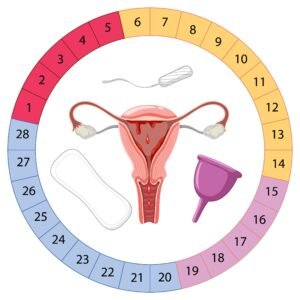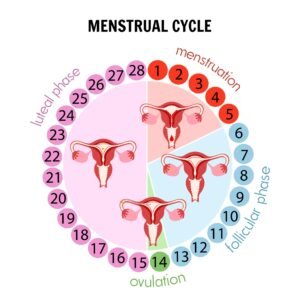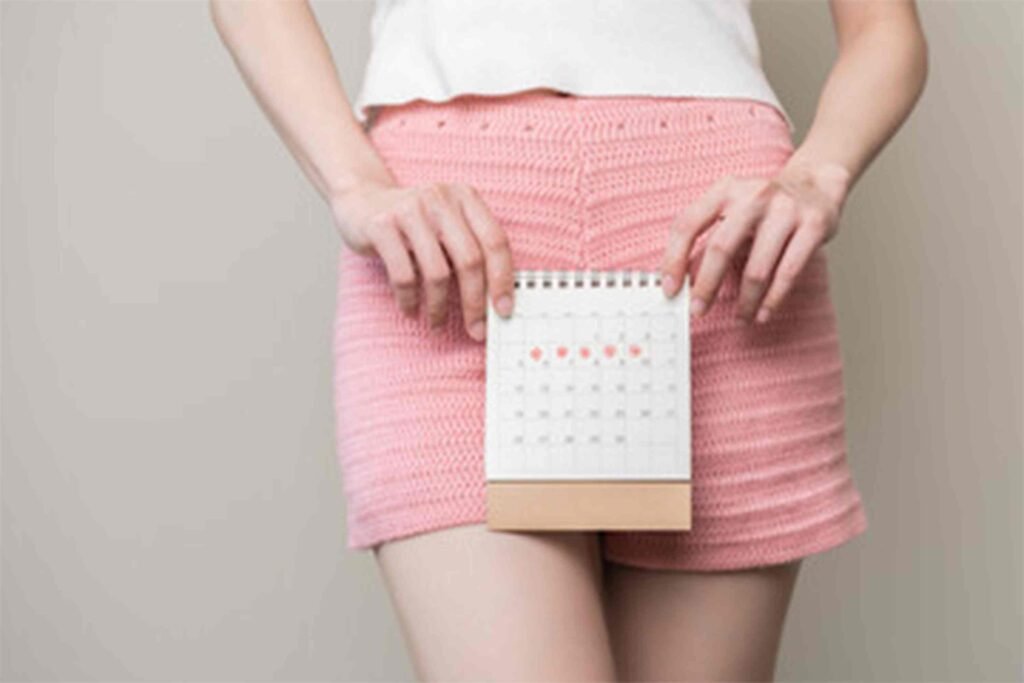How Your Menstrual Cycle Affects Fertility Week-by-Week
If you’ve ever wondered how your menstrual cycle connects to your chances of getting pregnant, you’re not alone. Understanding how the menstrual cycle affects fertility week-by-week can feel a little like learning a new language—full of confusing terms, fluctuating hormones, and tiny windows of opportunity. But here’s the thing: once you get a grip on what your body’s doing each week, you’ll feel way more empowered, whether you’re trying to conceive or just tracking your cycle for better self-awareness.
Let’s take a friendly walk through your cycle—one week at a time—and explore how the menstrual cycle affects fertility in practical, real-life terms. We’ll break down what’s happening with your hormones, your body, your emotions, and, of course, your fertility during each phase.
How Your Menstrual Cycle Affects Fertility Week-by-Week
Week 1: The Menstrual Phase – Time to Reset
Days 1–7 (or whenever your period ends)
Your cycle starts on Day 1 of your period. This week is often misunderstood, but it’s actually one of the most important foundational phases when it comes to fertility. Even though you’re bleeding, your body is already gearing up for what’s next.
What’s Happening
a. Your estrogen and progesterone levels are low at the start of your period.
b. The uterine lining that built up during your last cycle is shedding.
c. Your brain is signaling your ovaries to start maturing new follicles (tiny sacs that contain immature eggs).
Fertility Outlook
During your period, fertility is generally low, but this doesn’t mean it’s zero. Sperm can live inside your body for up to five days, so if you have a short cycle and ovulate early, there’s a chance you could conceive from intercourse during the tail end of your period.
How the Menstrual Cycle Affects Fertility This Week
Even though you’re not at peak fertility, this week sets the stage. Your body is preparing to select one dominant follicle to mature and release an egg—aka, ovulation. Hormones are starting to shift, and that shift is the first step toward your fertile window.

Week 2: The Follicular Phase – Gearing Up
Days 8–13 (give or take)
Now things start to pick up. Your period is over, you’re probably feeling more energized, and your hormones are beginning to rise.
What’s Happening
a. Estrogen is climbing, thickening the uterine lining.
b. One dominant follicle is chosen to release an egg.
c. Cervical mucus is changing—becoming wetter and more sperm-friendly.
Fertility Outlook
This is the beginning of your fertile window. As estrogen rises, your body gets more fertile. You might notice your libido increasing, cervical mucus resembling raw egg whites, and even a boost in mood or confidence.
If you’re trying to conceive, this is a great time to start having sex every other day. You’re not ovulating yet, but sperm can wait around for the egg to drop.
How the Menstrual Cycle Affects Fertility This Week
Here’s where the menstrual cycle affects fertility most noticeably. Your hormones are working together like an orchestra, building up to ovulation. Missing this window—or not recognizing it—is one of the most common reasons conception doesn’t happen as quickly as hoped.
Week 3 (Part 1): Ovulation Phase – The Main Event
Days 14–16 (varies by cycle length)
Ovulation is go-time. This is the most fertile time of your cycle—the window where all the magic happens.
What’s Happening
a. The dominant follicle bursts and releases an egg.
b. Estrogen peaks, and so does luteinizing hormone (LH).
c. Your body is primed for conception.
Fertility Outlook
This is the absolute best time to conceive. The egg only lives for about 12–24 hours, but remember—sperm can survive for days. That means having sex in the few days leading up to ovulation (and on the day itself) offers the highest chance of pregnancy.
Your body often gives you clues:
a. Cervical mucus becomes slippery and stretchy.
b. Some women experience ovulation pain (mittelschmerz).
c. You may notice a slight dip and then a rise in basal body temperature (BBT).
How the Menstrual Cycle Affects Fertility This Week
This is the week when the menstrual cycle affects fertility in the most direct way. Ovulation is your body’s monthly shot at conception. Timing intercourse during this 2–3 day window is key if you’re trying to get pregnant. Missing ovulation, or ovulating irregularly, can make conception harder.

Week 3 (Part 2): The Early Luteal Phase – The Waiting Game
Days 17–21:
Once ovulation occurs, your body enters the luteal phase. If the egg is fertilized, this is when implantation can happen. If not, your body will prepare to shed the uterine lining again.
What’s Happening
a. Progesterone levels rise sharply to support a potential pregnancy.
b. Your basal body temperature remains elevated.
c. Some women feel post-ovulation symptoms like breast tenderness or bloating.
Fertility Outlook
Fertility drops rapidly after ovulation. The egg can no longer be fertilized after about a day, and once that window closes, there’s nothing more sperm can do.
If fertilization occurred, the embryo may start traveling toward the uterus and attempt implantation around days 6–10 after ovulation.
How the Menstrual Cycle Affects Fertility This Week
At this point, how your menstrual cycle affects fertility shifts from opportunity to outcome. Progesterone helps create a uterine lining thick and sticky enough for an embryo to implant. If your progesterone levels are low, implantation might not occur even if fertilization did.
Week 4: The Late Luteal Phase – What’s Next?
Days 22–28 (or until your next period starts)
This is the time when either implantation succeeds and pregnancy begins, or hormone levels drop and your body prepares to reset.
What’s Happening
a. If no implantation occurs, progesterone and estrogen decline.
b. PMS symptoms may kick in: mood swings, fatigue, cramps, cravings.
c. Your period will begin again if pregnancy doesn’t happen.
Fertility Outlook
Fertility is low to nonexistent this week. It’s mostly a waiting game, especially if you’re hoping to see a positive pregnancy test. If implantation did occur, some women might experience early pregnancy signs—fatigue, tender breasts, or even light spotting.
How the Menstrual Cycle Affects Fertility This Week
This is where you see the after-effects of how the menstrual cycle affects fertility overall. If everything aligned—egg met sperm, implantation occurred, and hormones remained balanced—pregnancy begins. If not, your body resets and starts over.
Irregular Cycles and Fertility
Not everyone’s cycle fits neatly into four weeks. Irregular periods can make it tricky to predict ovulation and time intercourse. Here’s how irregular cycles influence how the menstrual cycle affects fertility:
a. PCOS (Polycystic Ovary Syndrome): Irregular ovulation or none at all.
b. Thyroid issues: Can delay or stop ovulation.
c. Stress and extreme exercise: May cause hormonal disruptions.
d. Perimenopause: Hormone fluctuations can shorten or lengthen the cycle unpredictably.
Tracking symptoms, using ovulation predictor kits, and getting hormonal bloodwork done can help uncover what’s going on beneath the surface.

Cycle Tracking Tools That Help
To better understand how your menstrual cycle affects fertility, consider using:
- Period tracking apps (like Clue, Flo, or Kindara)
- Basal body temperature (BBT) charts
- Ovulation predictor kits (OPKs)
- Cervical mucus monitoring
- Fertility monitors that measure LH, estrogen, and even progesterone
These tools can help identify patterns and give clearer insight into your most fertile days.
Lifestyle Factors That Influence Fertility
Your cycle doesn’t exist in a vacuum. The way your menstrual cycle affects fertility is also shaped by daily habits, health conditions, and overall wellness. Here are some ways to support your cycle and boost fertility naturally:
1. Nutrition
a. Focus on whole foods, healthy fats, and lean proteins.
b. Consider supplements like folic acid, CoQ10, and iron (under medical guidance).
2. Exercise
a. Moderate movement like walking, yoga, or light strength training can help regulate hormones.
b. Too much intense cardio can disrupt your cycle.
3. Stress Management
a. Chronic stress can lead to cycle disruptions or delayed ovulation.
b. Meditation, journaling, therapy, or even daily deep breathing can help.
4. Sleep and Routine
a. Aim for consistent, quality sleep—7–9 hours is ideal.
b. Regular sleep supports hormone balance.

When to Seek Medical Help
If you’ve been trying to conceive for 6–12 months with no success, or if your cycle is irregular, missing, or accompanied by painful symptoms, it’s a good idea to talk to a healthcare provider. You might need help identifying ovulation or addressing underlying conditions.
Final Thoughts: Knowing Your Cycle is Power
Understanding how your menstrual cycle affects fertility isn’t just about making a baby—it’s about connecting with your body in a deeper, more intentional way. Whether you’re actively trying to conceive, planning ahead, or simply tuning into your hormonal health, the knowledge you gain from tracking your cycle is priceless.
Each week of your cycle plays a role in the bigger fertility picture. And while it can feel like a lot to take in, with time and awareness, it becomes second nature. You begin to recognize your body’s rhythm, and that awareness gives you clarity, confidence, and control.


